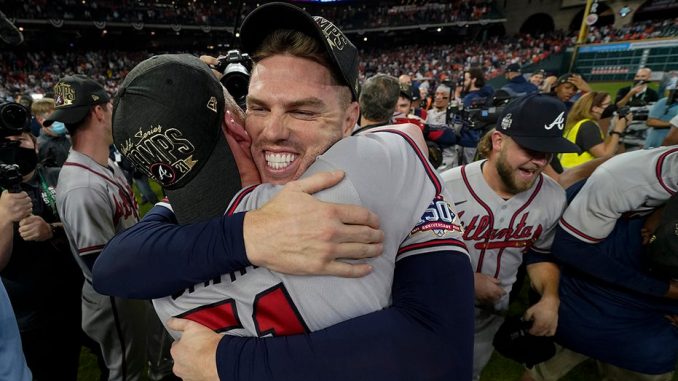
What a difference a year makes.
Just before last year’s Priorities post, the Braves had just suffered a crushing loss in the NLCS to the Dodgers after having pushed the team that would go on to win the World Series to the brink of elimination. Every game during the weird, truncated regular season was played in front of empty stands and all of the playoff games were played at neutral sites in front of sparse, carefully social-distanced crowds thanks to the catastrophic COVID-19 pandemic.
Despite a rash of regular season setbacks that saw Atlanta lose a key rotation member before he could even throw a pitch, lose both rostered catchers to injury on the same May night, lose a presumptive MVP candidate just before the All-Star break, and never get above .500 until August 6 — the Atlanta Braves are the World Series champions.
There are many, many heroes in the team’s story this year. The team was outstanding this postseason; this wasn’t a lucky team getting hot at the right time, this was a stacked club reaching their potential and dominating three different squads that were built for success. General manager Alex Anthopoulos’s decision to buy at the trade deadline despite all of the odds-makers saying the Braves should sell and then completely remaking a starting outfield will be analyzed for years. This is also one of the rare opportunities in sports where fan participation had a clear and demonstrative effect — Truist Park welcomed the second highest attendance in all of baseball, and combined with a packed Battery complex gave Anthopoulos the financial room to take on the salaries the team needed to push it over the finish line. Finally, this championship is a vindication for so many of the talent acquisition and player development staff over the last six years, many of whom are no longer with the organization. They believed in and nurtured this core of young players — Ozzie Albies, Dansby Swanson, Austin Riley, Max Fried, Ian Anderson, Ronald Acuña Jr., A.J. Minter, Mike Soroka.
One part of me wants to savor this. I don’t even know if it’s completely sunk in. But another part of me woke up on the bright first day of the off-season thinking about what the team will need to do to be the first repeat World Series winners in 22 years. That side won out.
Taking Stock
We never know what the Atlanta budget is from year-to-year, and the team keeps that number under wraps. That said, for many years it was possible to come to a ballpark number based reading between the lines of front office statements, the Liberty Media quarterly earnings reports (this just in — the 3rd quarter was very, very good), and team behavior. In 2020 that got thrown out the window thanks to the pandemic and the resulting losses incurred by the club. This year it gets thrown out the window because of the unmitigated financial success of the season that included 9 additional sold-out playoff games, the extra merchandise sold thanks to the long postseason run, and a Battery mixed-use complex nearing completion and bursting with tenants. Adding to that is $33 million coming off the 2021 roster with the expiring contracts of Drew Smyly and (gulp) Freddie Freeman.
I don’t know what the 2022 player budget will be, but it will certainly be the highest in team history. While no one should expect the Atlanta Braves to be the biggest spenders in any offseason, there’s nothing to indicate that the team shouldn’t be able to make significant off-season upgrades.
The farm system has a number of high-quality prospects that could provide help in 2022, either in the form of promotion to the big leagues or as potential trade options. The biggest difference between the current Atlanta Braves organization and that of the last window of opportunity (2010-2014) is that farm system was robust enough for four seasons in a row to power significant trades that pushed the team into the postseason.
- 2018: Kevin Gausman, Adam Duvall, Brad Brach, Darren O’Day, and Jonny Venters for Brett Cumberland, Evan Phillips, Bruce Zimmermann, Lucas Sims, Matt Wisler, Preston Tucker, and international free agent pool money
- 2019: Chris Martin, Shane Greene, and Mark Melancon for Kolby Allard, Joey Wentz, Travis Demeritte, Dan Winkler, and Tristan Beck
- 2020: Tommy Milone for Greg Cullen and A.J. Graffanino (OK, you can’t win them all)
- 2021: Jorge Soler, Richard Rodriguez, Eddie Rosario, Stephen Vogt, Adam Duvall (again) and Joc Pederson for Kasey Kalich, Bryse Wilson, Ricky DeVito, Pablo Sandoval, Mason Berne, Alex Jackson, and Bryce Ball
Prospects currently closest to the majors included Opening Day outfielder Cristian Pache; catcher Shea Langeliers; starting pitchers Kyle Muller, Bryce Elder, and Spencer Strider; and relief candidates Daysbel Hernandez and Brooks Wilson. There are also young veterans that haven’t quite established themselves like pitchers Touki Toussaint and Kyle Wright, and catcher William Contreras. Others that are longshot possibilities for 2022 are outfielders Drew Waters, Justin Dean, Michael Harris, and Jesse Franklin; infielder Braden Shewmake; and pitchers Freddy Tarnok, William Woods, Jared Shuster, Jasseel De La Cruz, and Indigo Diaz.
There are three players with options that will need to be decided on within the next two days. Josh Tomlin has a club option of $1.25 million, while Joc Pederson and Adam Duvall have complicated million player/club mutual options of $10 million and $7.5 million respectively.
Priority 1: Lock Up Freddie Freeman
I’ve said it many times, this organization drafted me when I was 17, and then they gave me the opportunity to be in the big leagues at 20 years old, and they gave me the starting job the next year. They didn’t really owe me anything. I owed everything to them because they gave me the opportunity to live out a childhood dream.
— Freddie Freeman, 11/2/2021
To anyone that cares to ask, Freddie Freeman has repeatedly indicated his desire to remain an Atlanta Brave for the rest of is career, and no one from the Atlanta Braves has indicated any desire for Freeman to play anywhere else but Atlanta. So why hasn’t a deal been done yet?
I suspect it has something to do with Freeman winning the NL MVP in 2020 and his agent justifiably wanting to capitalize on it. Before that happened, the consensus was the Freeman would likely get something similar to the 5 year/$130 million contract that first baseman Paul Goldschmidt signed with St. Louis before the 2019 season. The Braves, while no doubt delighted by Freeman’s 2020 performance, perhaps looked at an MVP award from a 60-game season in not quite the same way and balked at a significant yearly increase over Goldschmidt’s $26 million a season.
Reports are that there was at least some negotiations during the season, but Freeman’s slow start may have complicated things there as well. So now Freeman is a free agent, and will be free to negotiate with any other team as of Monday, November 8. On one hand, Freeman’s constant refrain about wanting to stay in Atlanta is not making his agent’s job an easier. On the other hand, it’s been successful in increasing public pressure on the Braves front office to get him signed.
My guess is that this will get done before November 8. But I also thought it would be done before the end of spring training, so take that as you will.
Priority 2: Figure Out The Back End of the Rotation
Right now we know that Charlie Morton, Max Fried, and Ian Anderson will return to take three of the rotation spots. Mike Soroka would take a fourth if he can complete his recovery from his second Achilles tendon surgery — but given that no one has ever done that before, the Braves should make plenty of contingency plans.
The internal candidates for the other two spots are Huascar Ynoa, Kyle Wright, Tucker Davidson, Touki Toussaint, and Kyle Muller, and in my opinion in that order. I don’t think they’ll leave more than one spot open for this group, so that means bringing in someone, likely on one of Alex Anthopoulos’s favorite one-year make-good contracts. There are plenty of starters on the free agent market that could fit that role. If Anthopoulos should go the trade route, the Braves could be in the market for Chris Bassitt of the Oakland A’s, a team that is rumored to be primed to dump salary.
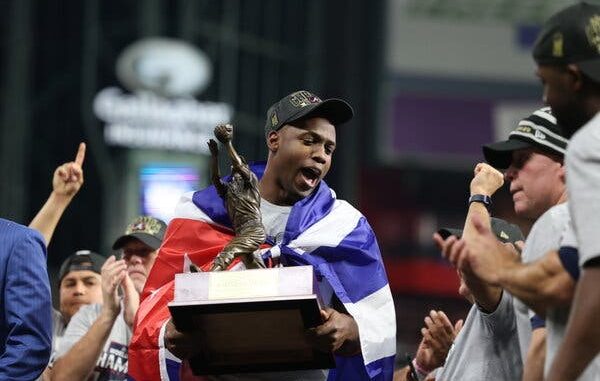
Priority 3: Figure Out The Outfield (and DH?)
The Braves will not rush back Acuña, who may not be back until May. It should also be assumed that Marcell Ozuna will not be available at the beginning of the season while serving suspension for his domestic violence arrest; in fact, I find it highly unlikely that Marcell Ozuna will ever be back with the team.
That means that they will be on the lookout for three starting outfielders, and if the new CBA brings the Designated Hitter rule to the National League as widely conjectured a DH as well. Of the four trade acquisition outfielders, Eddie Rosario and Jorge Soler likely helped their agents the most with their play, while Adam Duvall lead the NL in RBI. Pederson slowed down after a good start with the team and had his postseason moments, but from a performance standpoint should be seen behind the other three, though his improvement against left-handed pitchers this season enhances the chance that a team could see him as an everyday option.
Guillermo Heredia is under team control in arbitration if the team wishes to retain him. Then there is Cristian Pache, who’s recovery from his early-season hamstring issues and improved approach allowed him to become one of the hottest hitters in AAA down the stretch.
My guess is that Duvall and Pederson will be back along with Heredia. Pache will once again be given the opportunity to win the center field job, but if he doesn’t the Braves would have the option play Duvall there. Pederson would play right until Acuña returns, at which point Atlanta would have two solid outfield bench options with Pederson and Heredia.
So that leaves left field and designated hitter. No doubt the Braves would be interested in bringing back both Rosario and Soler for those spots, and re-signing one or both of them is probably the leader going into the clubhouse. Other free agents that could be a fit would be Nick Castellanos, Michael Conforto, Kyle Schwarber, Avisail Garcia, Mark Canha, Starling Marte, or Nelson Cruz. Trade options are even more wide open, but I could see Baltimore parlaying Cedric Mullins‘s All-Star season into the final touch of their rebuild.
An out-of-the-box solution would be signing one of the free agent infielders and moving either Ozzie Albies or Dansby Swanson to the outfield, which brings us to…
Priority 4: Figure Out A Long-Term Plan for Shortstop
Atlanta has one more season of team control on shortstop Dansby Swanson through arbitration, which is estimated to put Swanson at around $10 million for 2022. If the Braves are interested in retaining Swanson, now would be the time to approach him about signing a multi-year extension.
There’s always been some difficulty in assessing Swanson’s value. He is a strong defender at shortstop, but not really an elite, top-10 type of defender. When he is hitting well, he can carry a team for awhile, but he also tends to go into maddeningly long slumps. He’s obviously plenty good to anchor shortstop for a championship-caliber team, but going into an offseason with an all-world group of free agent shortstops, it doesn’t take much imagination to guess the Braves may move to make an upgrade.
Those potential upgrades include Marcus Semien, Trevor Story, Corey Seager, Javier Baez, and recent World Series foe Carlos Correa.
This is an important decision for the club. They could punt on this for a season and let Swanson ride it out, perhaps to pursue Braves nemesis Trea Turner in free agency, but my guess is that Swanson’s performance wouldn’t be enhanced by the distraction of a contract year. The Braves should not leave this an open question.
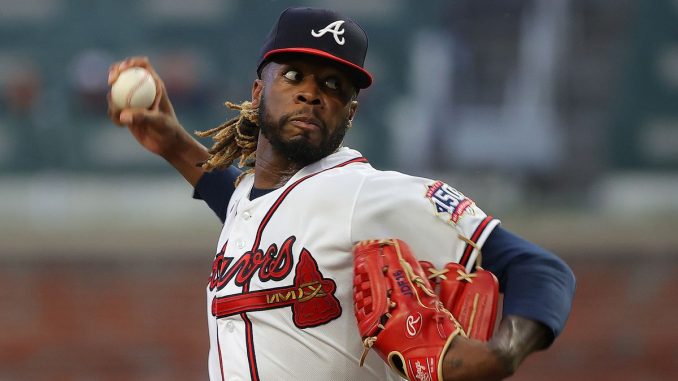
Priority 4: Shore Up the Right-Hand Side of the Bullpen
The story of Atlanta’s 2021 playoff run would have been very different without the enormous contributions of left-handed relievers Tyler Matzek, Will Smith, and A.J. Minter. One of the things that make these relievers stand out is that they are roughly as effective against right-handed hitters as left-handed — in some cases more effective. That allowed the Braves to somewhat hide a weakness in right-handed relievers.
The one right-hander that has been consistent in 2021 is Luke Jackson, and ironically he has also been Atlanta’s most effective reliever against left-handed batters. Chris Martin started the season expected to be another late-inning option but his performance suffered as the season went on (though he had a very nice post-season) and is now a free agent. Jacob Webb has had his moments as well, but should still be considered a low- to medium-leverage option. Edgar Santana, who spent most of the season with the big league club and didn’t embarrass himself, has already been released. Jesse Chavez, an ageless wonder who essentially replaced the injured and unproductive Josh Tomlin as the emergency opener/junk innings guy is also a free agent. Finally there is mid-season pick-up Richard Rodriguez, who has gone from Pirates closer to potential non-tender candidate.
Finally, it may be time to look at starter options that don’t take that 5th starter role and convert them to the bullpen. Touki Toussaint in particular has had some major league success as a reliever before and has the stuff and temperament to potentially be successful there.
As always there are a plethora of interesting free agent options, especially when it comes to right-handers, and I will not bother to list them all out. The bullpen is already a strong unit heading into 2022, but another strong right-handed option or two could make it a world-beater.

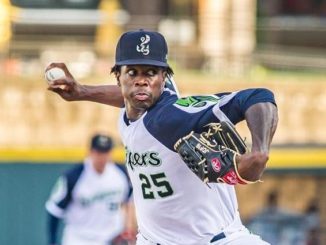
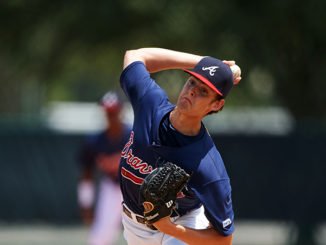
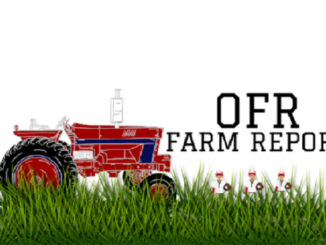
Good read. It will be a fascinating if frustrating off-season. I suspect the holdup with Freeman (nobody really knows) is less about AAV and more about the number of years. I could see AA offering 3-4 and Freeman holding out for 6-8 to achieve is goal to become a lifetime Brave.
Thanks for reading. And I suspect you are correct regarding length of contract being the hold-up.